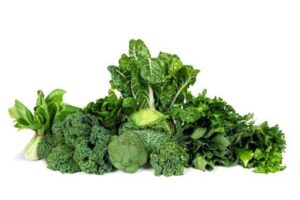Consuming a healthy, nutritious, and balanced diet can protect against malnutrition, communicable and non-communicable diseases like cancer, diabetes, polycystic ovarian disease, to name a few. With rapid development, there has been a sudden shift in the lifestyle pattern of human beings. An unhealthy diet, lack of activity, rapid modernization, and urbanization are the leading causes of change in the shift from consuming a healthy diet to an unhealthy diet. We know we are keener in consuming fast foods or packed items to accommodate ourselves in the daily hustle.
The exact bifurcation of the nutrition may vary from person to person depending on their characteristics, behavior, body mass index; however, the basic underlying principle of a healthy diet remains the same. One must remember to balance the intake with the expenditure for a balanced, healthy diet.
Here are some superfoods that you can include in your diet for healthy living.
1.Eat more leafy vegetables

Do you often skip greens from our diet? While most greens don’t taste good, they are a rich source of fiber. Studies suggest that consuming leafy vegetables six times a day might reduce your chances of cardiovascular diseases. These greens are rich in Vitamin A, C, E, K, and B and other nutrients like phosphorus, zinc, and calcium. So the next time you skip your greens because they taste bland, make a smoothie out of it, add your favorite fruits, and enjoy your day.
2. Emphasize fruits

It is said that one must consume at least five fruits a day for a healthy lifestyle. Sounds real tough, right? Fruits like apple, blueberries, avocado are an excellent source of antioxidants. Antioxidants help combat free radicals. Free radicals are disintegrating substances that harm our bodies in the long run. If you find consuming five fruits a day taxing get creative and use them to garnish your meals. Disinfect your fruits before consuming them. Why not add a few berries to your cereal bowl or your smoothies?
3. Nuts

Nuts are a rich protein source and are packed with fiber antioxidants, fatty acids, vitamins, and minerals. Nuts are also rich in calories, so make sure you consume in moderation. Nuts have monosaturated fats, which are suitable for our bodies. Not all nuts have monosaturated fats; some nuts like peanuts have higher risks to your health; hence look for walnuts, pistachios, cashews, pecans for a good crunch.
4. Oily fish

Oily fishes such as salmon, trout, mackerel, herring, sardines, and anchovies are rich sources of Omega 3 Fatty acids and have been found to reduce health risks if consumed in moderation. These fishes have oils in their tissues and around their gut. Oily fishes also are a great source of Vitamin A, D, and minerals. Studies suggest that oily fishes have helped with inflammatory conditions like arthritis. The Omega 3-fatty acids also benefit your eyes by halting age-related muscular degeneration.
5. Meat

Do you keep meating often? If consumed in moderation, meat such as chicken and eggs are cost-effective, healthful, and rich sources of protein. One must always be mindful while preparing and cooking chicken, which affects how healthy the chicken turns out to be. Eggs, on the other hand, are rich sources of vitamin B2 and B12, which help in preserving energy and generating new red blood cells. Don’t hold on to your ham for too long to avoid health issues.

